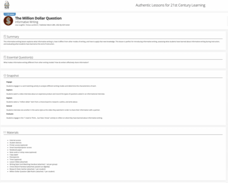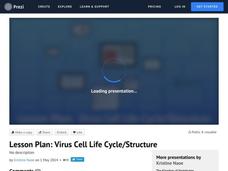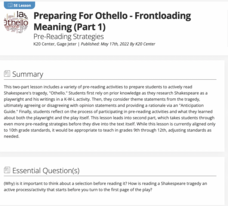National Endowment for the Humanities
Narrative Voice in Moby Dick
Call him a reliable narrator! Ishmael is the focus of a lesson that asks readers to analyze the complex character of Herman Melville's narrator as he is introduced in the first chapter of Moby Dick.
K20 LEARN
The Million Dollar Question: Informative Writing
Introduce high school freshmen to the characteristics of informative writing with a 5-day lesson plan that distinguishes informative writing from other modes. Scholars learn how to search for and cite reliable resources, then research...
Texas Education Agency (TEA)
Drawing Conclusions Based on the Sufficiency and Strength of Research (English III Reading)
High school juniors learn how to construct a strong argument by crafting a claim and using neutral language backed by evidence from reliable sources. To do so, they learn to evaluate sources and evidence to support claims. They then...
English Enhanced Scope and Sequence
Research Project Embedded with Media Literacy
Here is a phenomenal language arts lesson on media literacy for your middle and high schoolers. In it, learners produce a research product in the form of a public service announcement (PSA). First, they view examples of these PSA's to...
National Endowment for the Humanities
Edgar Allan Poe, Ambrose Bierce, and the Unreliable Narrator
Stories by Edgar Allan Poe and Ambrose Bierce provide readers with an opportunity to investigate unreliable narrators. The lesson plan begins with an activity about different types of point of view and continues as scholars apply their...
Curated OER
Discussion Guide for The Catcher in the Rye
Is Holden Caulfield a trustworthy narrator? Groups work together to find evidence in The Catcher in the Rye to support a yes or no stance.
Mr. Roughton
The Travels of Marco Polo
Were the stories of Marco Polo's travels and interactions with the Mongols actually true? Using an excerpt from the book The Travels of Marco Polo, your young historians will answer guiding questions to discuss the accuracy and...
Curated OER
Political Campaign Ads
During a political campaign, you can hardly turn around without encountering an endorsement or attack on a candidate. High schoolers examine the ways that negative advertisement, positive advertisements, and everything in between can...
Macmillan Education
Study Skills
Good study habits are key to success in school. The activities in this packet are designed to get kids thinking about improvements they could make in their study habits.
Prezi
Virus Cell Life Cycle/Structure
Viruses were nano before it was cool to be nano. The presentation covers the structure of a virus cell and the life cycle of a virus. It also includes two videos illustrating the virus cell in greater detail.
American University
Factitious
Truth or factitious? Users of an engaging interactive test their ability to identify whether an article is real or fake news.
Newseum
Can I Trust the Creators?
It's easy to find information at the click of a mouse, but is it trustworthy? Pupils learn about the E.S.C.A.P.E. acronym for evaluating sources. Next, learners read a news story and evaluate its sources to determine credibility. Last,...
Stanford University
Japan and America
When Commodore Matthew Perry sailed to Japan and demonstrated American naval strength, he forced the empire to engage in trade with the United States. How did this new, strong-armed relationship influence both parties? Pupils consider...
Stanford University
Chinese Immigration and Exclusion
The Chinese Exclusion Act was the first race-based restriction on immigration in American history. Why was the act passed after Chinese immigrants helped build the Transcontinental Railroad? A series of documents, including speeches and...
Stanford University
Captain Cook
Known as the first European to see places like Australia and New Zealand, Captain Cook led the way for the English into the world of exploration. A primary source image of Cook's firsthand account of his voyages and discussion questions...
EngageNY
Using Search Terms for Further Research: Industrial Organic Food Chain
Class members conduct independent research to continue examining the consequences of the industrial organic food chain from Michael Pollan's The Omnivore's Dilemma. Pupils learn about source credibility and effective search terms, then...
EngageNY
Contrasting Evidence: “Games Can Make a Better World” and “Video Games Benefit Children, Study Finds”
Anecdotes, analogies, testimonies, statistics. The most powerful arguments rely on multiple types of evidence. Scholars explore the topic as they read contrasting evidence about the benefits of video games. They complete Venn diagrams to...
K20 LEARN
Preparing for Othello - Frontloading Meaning (Part 1): Pre-reading Strategies
The success of any lesson based on a complex text relies heavily on what instructors do before beginning the reading. Before reading Othello, scholars engage in a series of pre-reading activities, including completing an anticipation...
K20 LEARN
Street Cred: Evaluating Sources
A instructional activity on evaluating sources of information teaches scholars to "think twice" before using a source. Researchers examine a resource's home page, author, and sponsor, as well as the date published and the documentation...
Stanford University
Boston Massacre
The Boston Massacre was a propaganda victory for those protesting British rule over the American colonies. By using images from Patriots, as well as the testimony of witnesses, scholars consider what may have happened on that fateful day...
Stanford University
Lunchroom Fight II
To determine who should be suspended for a lunchroom fight, groups must source, contextualize, and corroborate the testimonies of various participants and witnesses.
Historical Thinking Matters
Spanish-American War: 1 Day Lesson
After analyzing newspaper articles portraying different perspectives of the explosion of the Battleship USS Maine, your young historians will take a stand on which position is the most believable in both discussion and writing.
NASA
Rain Gauge Activity
Complete teacher narrative and presentation slides for teaching about Earth's water make up the bulk of this lesson. Embedded within the slide show, you will find videos about the water cycle, keeping track of the limited supply of fresh...
NASA
Erosion and Landslides
A professional-quality PowerPoint, which includes links to footage of actual landslides in action, opens this moving lesson. Viewers learn what conditions lead to erosion and land giving way. They simulate landslides with a variety of...
Other popular searches
- Validity and Reliability
- Data Reliability
- Internet Reliability
- Teaching Website Reliability
- Reliability of Sources
- Source Reliability
- Resource Reliability
- Reliability and Objectivity
- Reliability in Practicals
- Research Reliability
- Reliability of Texts
- News Reliability

























